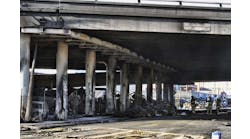Delaware Gov. Jack Markell is asking legislators and Delawareans to support an increase in the state motor fuels tax as part of a plan to create a reliable revenue stream for the state’s Transportation Trust Fund (TTF), significantly boost spending on transportation projects statewide and put thousands of Delawareans to work over the next five years.
Delaware’s motor fuels tax has not been increased in the last 19 years (since 1995). The rates are 23 cents per gallon for gasoline and 22 cents per gallon for special fuels, including diesel. A 10-cent-per-gallon increase in motor-fuel and special-fuel taxes would generate an additional $50 million for the trust fund that pays for roads, bridges and other essential transportation elements. The estimated additional cost to motorists would be $57 per year or $4.78 per month.
Under Markell’s plan, increased motor fuels tax revenues would be coupled with a fiscally-responsible borrowing strategy that keeps the Delaware Department of Transportation (DelDOT) on track to paying down debt. Fifty million dollars would be borrowed each year for five years by DelDOT to fund already-identified but delayed construction projects that address safety, congestion and maintenance needs under the state’s Capital Transportation Plan, Paving program and State of Good Repair initiative. The combination of $50 million in new revenue and $50 million in borrowing would pay for an additional $500 million investment in transportation projects statewide over five years.
Since 1999, the TTF has been dependent on fluctuating monies from state escheat funds. It has also been financially challenged for many years by a combination of stagnant or flat revenue streams, residual debt, rising operating and construction costs, increased transit expenses, ongoing maintenance requirements and steadily rising demand for new projects to keep pace with economic expansion and traffic growth. These challenges have caused the postponement or delay of more than 55 road projects in the current fiscal year. Deferral of projects leads to higher future costs in system maintenance, construction costs and right-of-way acquisition.
The governor is acting on recommendations of the TTF Task Force
The governor’s proposal comes in response to recommendations made by a bipartisan TTF Task Force, established by House Bill 500 (Section 112), composed of 24 members representing the Delaware General Assembly, various state agencies and other stakeholders form the public and private sectors. In establishing the task force, legislators recognized the need for a comprehensive review of transportation demands and funds available to meet to the state’s needs, calling for “predictable and sustainable funding to improve and maintain Delaware’s transportation system.”
“The TTF has experienced insufficient revenues over a significant period, managed only by the delay of necessary capital projects, in order to size the budget to meet available revenues,” said the 2011 Transportation Trust Fund Task Force Report
DelDOT has made considerable effort over the last two years to reduce operational costs and increase efficiency as part of the governor’s performance review process. These actions included reducing consultant costs, reducing overtime, limiting cell-phone usage, renegotiating contracts, eliminating vacant positions, improved technology and service delivery to increase efficiencies and reduce waste.
In addition, in the last two fiscal years the agency did not increase its operating budget and has reduced its debt, while introducing performance management principles in every operating division, adopting a data-driven process for developing the state’s Capital Transportation Plan and restructuring its transit operations to achieve financial sustainability.
As significant as these actions are in creating efficiency and controlling costs, they alone are not enough to close the gap necessary to adequately fund the TTF.


